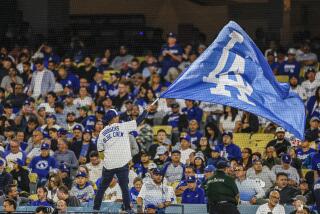Selig Seeks Edgier All-Star Game
- Share via
Motivated by last summer’s All-Star Game embarrassment, Major League Baseball owners, meeting in Phoenix on Thursday, are expected to endorse a recommendation by Commissioner Bud Selig that the winning league in the midsummer exhibition gets home-field advantage in the World Series. There will be no changes in the size of rosters.
Selig, who instructed umpires to call the 2002 game with the score tied, 7-7, after 11 innings because both the American and National League teams had used all of their pitchers and players, said Friday he hadn’t definitely decided on the home-field aspect, but it sounded as if he had.
“This is a chance to re-energize a game that’s gone flat,” Selig said. “Whatever the motivation, it’s overdue.”
Technically, he does not need ownership approval, but the players’ union would have to approve it -- a formality, industry officials believe.
Citing a rich All-Star history, Selig said, “Some people think that because of interleague play and free agency [with players frequently switching leagues] there is diminished interest in the game, but I think people still care who wins.
“It used to be a game played aggressively by players who cared and leagues which cared. It’s still the best of the All-Star games, but I think we can return the intensity and meaning that Arch Ward intended when he created the game in 1933. I also think it’s fair.”
Home-field advantage in the World Series -- which translates to four of the seven games and the first two at home -- currently rotates between the leagues. The 2003 World Series was scheduled to open in the National League city. Since the start of division play in 1969, teams with the home-field advantage have won 22 of the 34 World Series.
“This would be an absolute statement that you would manage the game to win,” said the Angels’ Mike Scioscia, who will manage the American League team in the 2003 All-Star game at Chicago’s Comiskey Park because the Angels won the AL pennant before winning the World Series.
Scioscia said the home-field advantage the Angels enjoyed in four games at Edison Field during the World Series was “obviously important. I mean, the energy we felt from our fans was tremendous.”
Thus, Scioscia said, All-Star starters elected by the fans would make more than a token appearance, pitchers would probably pitch longer, managers would be more involved in matchups and other strategy “and ... I think the players who didn’t get [to play] would understand.”
“As a kid growing up, and later as a player, not every player got in every time. I remember guys like Pete Rose saying, ‘This is my game, you’ll get your turn.’ League pride was something players took seriously, but it’s been diluted by interleague play and other factors, so I like anything that restores some of the competitiveness, makes it more than an exhibition of great stars, and I think this would.”
As Selig left Miller Park to the boos of hometown fans after terminating last year’s All-Star game, it seemed inevitable there would be changes.
The home-field aspect has been at the forefront of discussions among baseball officials who also considered expanding each league’s 30-man rosters before deciding against it.
Managerial strategy changed after the 1993 All-Star game in which AL Manager Cito Gaston was booed by Oriole fans at Baltimore’s Camden Yards for failing to use hometown favorite Mike Mussina, even though he had Mussina warming up in the late innings.
Instead of extending their early pitchers and saving one or two for the possibility of extra innings, subsequent All-Star managers, reluctant to receive the same abuse, took Gaston’s booing as indication they should use all of their pitchers and players, leading to last year’s fiasco managed by Joe Torre of the New York Yankees and Bob Brenly of the Arizona Diamondbacks.
Selig recalled Friday how players of the Ted Williams and Stan Musial caliber won early All-Star games with late-inning heroics and said, “I’m not saying the starters should play the entire game like [Musial and Williams] did, and I’m not dictating to the managers, but the pitchers and starters need to go a little longer. Everybody doesn’t have to play. You should be able to get by with 30 players.”
More to Read
Go beyond the scoreboard
Get the latest on L.A.'s teams in the daily Sports Report newsletter.
You may occasionally receive promotional content from the Los Angeles Times.






